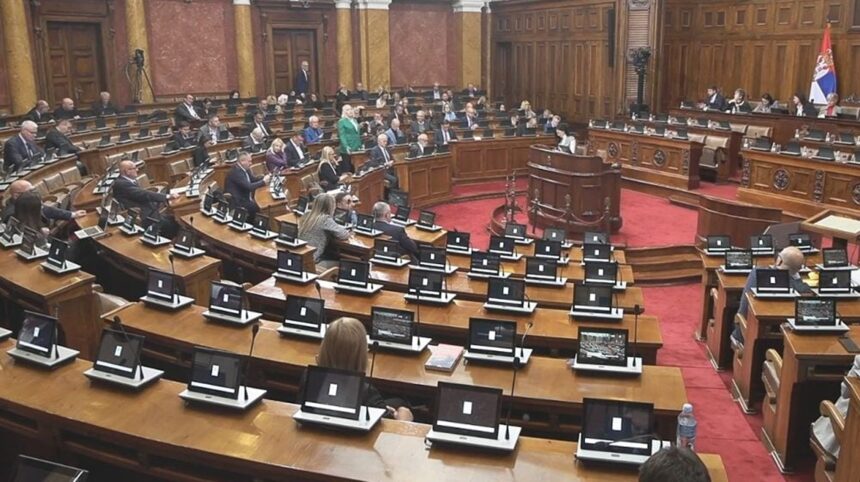Some opposition MPs in the Serbian Parliament today voiced a series of objections to the proposed special law (lex specialis) concerning the General Staff building in Belgrade, requesting its withdrawal, as the building is a cultural monument. MPs from the ruling coalition, however, argue that a memorial center will be built on the site.
MP Branko Lukić (We the People’s Strength – Prof. Dr. Branimir Nestorović) stated that the General Staff building is an “immovable, extremely valuable asset” important for the country and insisted that the proposed law should be withdrawn because it is illegal.
“Why should we demolish the symbol of this nation? We heard from Jovanov (SNS deputy) that reconstruction is possible, but expensive,” he said.
MP Ivana Rokvić (People’s Movement of Serbia) accused the government of treating history as an “investment plot.”
“You are selling it this time for a bit of Trump’s mercy. I am curious what you will offer to Putin’s son-in-law when he visits,” Rokvić added.
She also questioned whether the authorities would actually build a memorial center on the site, pointing to the Vladislav Rybnikar Elementary School memorial center, “where not a single brick has been laid in two years.”
MP Dragan Nikolić (Serbia Must Not Stand Still – Aleksandar Vučić) argued that a memorial center will certainly be built, with exhibits taken from “that ruin,” which he said would symbolize Serbia’s progress.
Natalija Stojmenović, deputy of the Green-Left Front, criticized the process, saying: “Every time you knew you were bringing something to the detriment of citizens, you shortened the discussion time because there is no way to explain why we should get Trump’s hotel instead of the General Staff.”
She further stated that Milenko Jovanov, who presented the proposed law, does not know what will replace the General Staff, “because in this country, the citizens do not decide, but the investors.”
MP Aleksandar Pavić (We Are the Strength of the People, Prof. Dr. Branimir Nestorović) added: “We should build a memorial center, not an investor.”
MP Petar Bošković (Serbia Center – SRCE) raised concerns about the infrastructure beneath the General Staff building, saying that the authorities will be held accountable for potential risks and calling it “high treason.”
Branko Pavlović, head of the parliamentary group “We – Voice of the People, Prof. Dr. Branimir Nestorović,” stated that he will support proposals from other parliamentary groups to assess the constitutionality of the Draft Law on Special Procedures (Lex Specialis) concerning the revitalization and redevelopment of the General Staff building complex, which was damaged during the 1999 NATO bombing.
Pavlović told Beta that once deputies sign the proposal, the Constitutional Court must consider it.
“I do not expect that the Supreme Court will quickly process the proposal and make a rapid decision,” Pavlović said.
A group of 110 deputies from the ruling Serbian Progressive Party proposed the law, which allows the demolition of the General Staff buildings in Belgrade, located between Kneza Miloša, Masarikova, Birčaninova, and Resavska streets, where Jared Kushner, son-in-law of US President Donald Trump, intends to build a hotel with a “memorial” referencing the NATO bombing of 1999.
Pavlović stated in Parliament that “the agreement with Mr. Kushner cannot be realized within Serbia’s legal system” and that “the purpose of the law is to bypass Serbia’s legal system, which is prohibited.”
According to Pavlović, delays in the Constitutional Court are due to political pressure and the judges’ consideration of political expectations.
“The Constitutional Court is not part of the judiciary and there is no guarantee of independence, as judges are directly elected by the Assembly, the President of the Republic, and a third portion is selected by the court itself,” Pavlović explained.
He added that “it is even worse that the Supreme Court is not fulfilling its duties and allows two of its five judge positions to remain vacant, so in addition to being overloaded with cases, it does not function fully.”
Of the 15 Supreme Court judges, five are elected by the Assembly from ten candidates proposed by the president, five are elected by the president from ten candidates proposed by the Assembly, and five are elected by the Supreme Court itself. Some judges do not perform duties for various reasons.
“The legal system is structured hierarchically, as are state institutions. That hierarchy must have a final authority; there can be no solution if the final instance does not function properly,” Pavlović said.
He emphasized that in no other country does the hierarchy continue indefinitely.
“The Constitutional Court should be composed of highly professional, conscientious, and strong-minded individuals, which is not the case in Serbia. This is why we face the problems we currently have,” Pavlović concluded.







